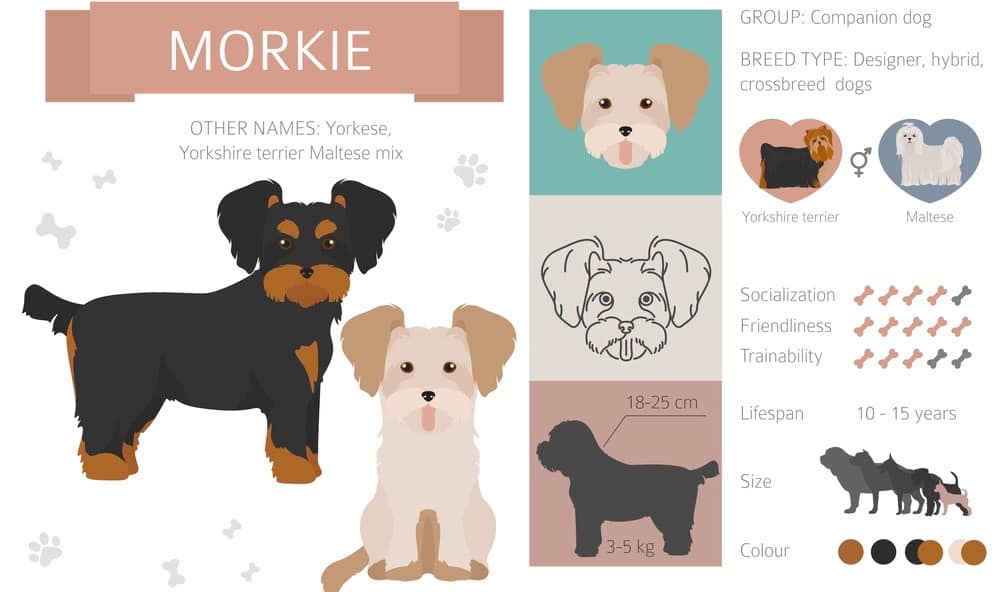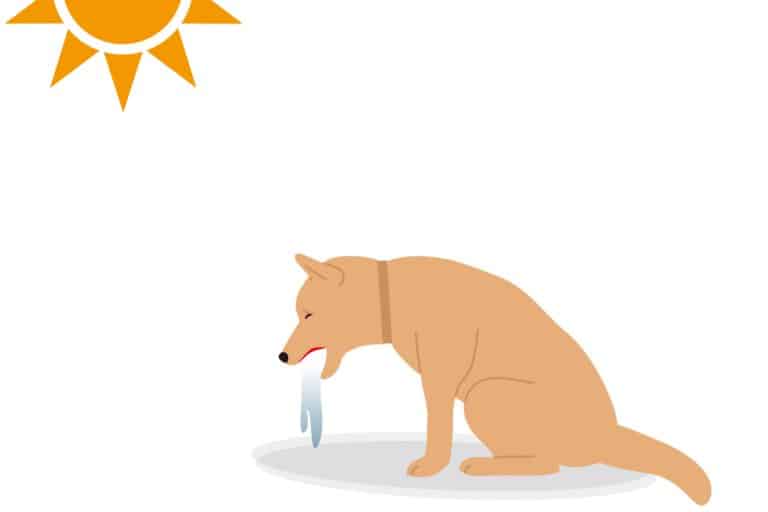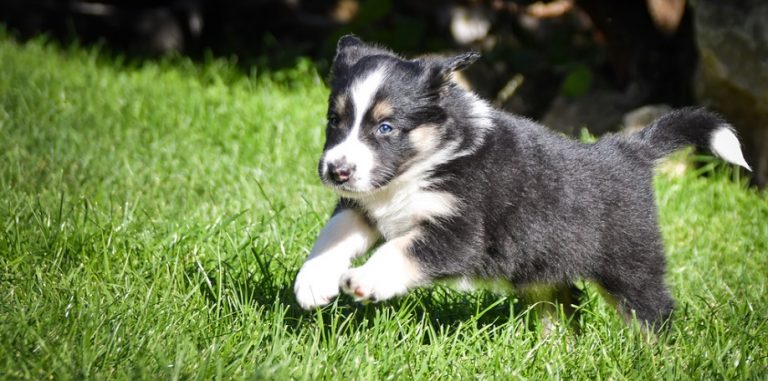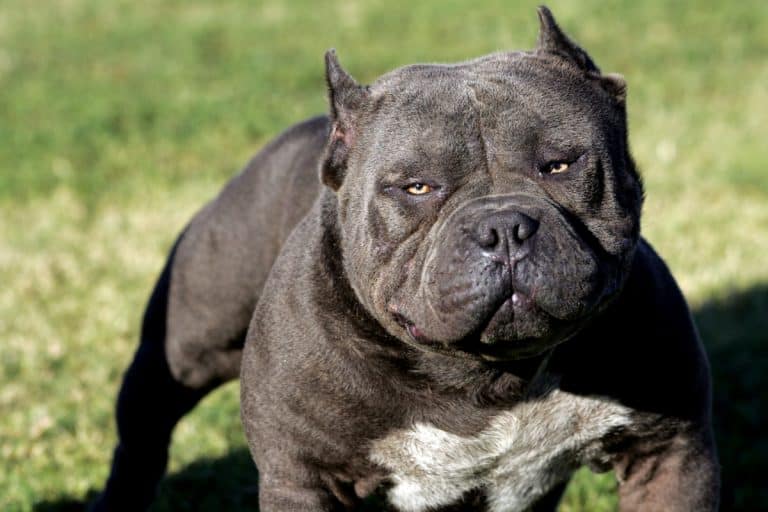Morkie Growth Chart – Weight & Size Chart
Morkies are a mixed breed of the Yorkshire Terrier and Maltese. To monitor their specific growth a Morkie growth chart will be quite useful in many situations.
Morkies are bursting with energy in a small package. They take many of the best characteristics from both their parent breeds.
You may sometimes hear Morkies being called Morkshire Terriers, and they are great for people who live in urban areas and apartments.
They tend to bark a lot, so they make good watchdogs despite their size because of their ability to warn you of intruders.
They are fluffy but do not overly shed. Not only that, but they need consistent care and grooming because their coats are usually long.
Even though Morkies are a bit stubborn they take well to training. They need exercise but not too much of it, so how many people view them as low maintenance.
When Is A Morkie Full Grown?

As a breed, Morkies are relatively new, which is why their size standards are a bit flexible. However, we know that Morkies come from Yorkies and Malteses, so they will be small dogs.
You should expect your Morkie puppy to reach adult size at around 10 months old on average. It would be safe to say that a Morkie will be full-grown anywhere between the 8 to the 12-month mark.
Since Morkies are small dogs they typically spend less time growing because they have less growing to do.
Other breeds take much longer to reach their adult size. That said, it is a bit difficult to determine exactly when they will be full-grown because they are mixed.
Remember that your Morkie’s size is determined by a variety of factors including genetics. So their size will be determined by their parent’s size.
Their parents come from two different breeds therefore, there is a lot to consider.
Morkie Weight Chart
The Morkie weight chart below will give size estimations for your Morkie. They were obtained from a collection of Morkies to get an average size estimation.
Understand that these are averages and your actual Morkie may be different.
You could have a Morkie that is a size bigger or smaller than what the chart says. This is quite normal because of the relative unpredictability of a Morkie size.
Also, understand that there may be some instances where the size differences should be investigated because they are drastically different.
In such cases, you should visit a veterinarian who will be able to let you know the definitive state of your dog’s health.
To use this chart, you need to have an accurate account of your Morkie’s age so that you can match it with the closest age on the left of the chart.
Then you can look for the coinciding weight measurements. You can also make predictions with the charts based on your dog’s future age.
Morkie Puppy Weight Chart
| Birth Weight (oz) | Weight at 12 Weeks (oz) | Adult Weight (lbs) |
|---|---|---|
| 3 oz | 22 oz | 3 lbs |
| 3.5 oz | 26 oz | 3.5 lbs |
| 4 oz | 30 oz | 4 lbs |
| 4.5 oz | 33 oz | 4.5 lbs |
| 5 oz | 41 oz | 5.5 lbs |
| 5.5 oz | 45 oz | 6 lbs |
| 6 oz | 49 oz | 6.5 lbs |
| 6.5 oz | 53 oz | 7 lbs |
| 7 oz | 57 oz | 7.5 lbs |
| 7.5 oz | 61 oz | 8 lbs |
| 8 oz | 67 oz | 8.5 lbs |
How Big Do Morkies Get?
To find out how big your Morkie will get, you can also look at his paws because when a dog has more growing to do, his paws will be slightly larger in proportion to the rest of his body. This goes for his head as well.
A DNA test will also help you to determine the final size of your Morkie because many times dogs have hidden breeds within them that their owners are unaware of.
Some unscrupulous breeders are not truthful about their dog’s genealogy. If your dog has ancestors of other breeds it could affect its size.
A Morkie’s genealogy may be a bit complicated for some, and this is why there is a generation classification to keep track of their genes.
To get an F1 Morkie, you need a Maltese of pure blood, as well as a Yorkie of pure blood. The offspring is called an F1 Morkie because their parents contributed 50% each.
When F1 Morkies that are bred with pure-blooded Malteses gives you an F1b Morkie. when you mate two F1 Morkies you will get an F2 Morkie.
Morkie Growth Chart – What To Expect

Birth – 2 Weeks
Morkie pups are born in small litter sizes of about 2-5 puppies. This is because their parents are also small dogs who can only handle small litters.
They are about 4 oz at birth, but they grow rather quickly and are about double this at the end of week 1.
A Morkie is quite sensitive at this time and will be sleeping a lot and the nursing from their mother.
You should allow the mother to do her job of providing nourishment and warmth. If for some reason she is unable to do this, then you must step in.
3 Weeks – 12 Weeks
Your Morkie puppy will grow rather quickly in its first six weeks of life. They usually gain around half-ounce of weight every day or about 4 oz of weight per week until they reach 6 weeks old.
At 6 weeks old, you can have a good estimation of their adult weight if you multiply this figure by 4. After 6 weeks their growth will start to slow considerably until they reach their adult size.
Your Morkie will be going through a number of changes as they grow rapidly and develop muscles. They will gain eyesight and hearing.
They are usually weaned during this time and are introduced to solid foods. You will hear them begin to bark and familiarize themselves with their surroundings.
4 Months – 6 Months
Your Morkie’s growth will be slowed considerably, but they will still continue to grow physically. They have mental development as well.
Morkies should be fully weaned by now with full control of their muscle function. They enter sexual maturity at this time, and it may be in heat. Their heat cycle lasts for approximately 21 days.
You will hear your Morkie barking a lot and exploring his environment. Make sure that you do not leave any harmful chemicals around because they could injure themselves.
7 Months – 9 Months
Your Morkie should be properly socialized and exposed to unfamiliar places and people so that he will be used to these things as a part of his training.
This will save you from a lot of trouble later on because Morkies tend to do a lot of barking in unfamiliar circumstances and around unfamiliar people.

You will notice that your Morkie desires to socialize with other dogs depending on where you take him.
He does not require a lot of exercise, but he can go on light walks where he can socialize.
10 Months – 12 Months
This is typically the time when your Morkie will reach his adult weight and height. Remember that he does not have much growing to do because he is a small breed.
He will be active and full of life. He will be learning his boundaries and this is where proper training and socialization come into play.
They are needed very much for a well-behaved Morkie. A fixed schedule of feeding and exercise will be good for him.
Adult
Your Morkie will be used to adulthood by now. Make sure that you adjust their rations to their level of physical activity because Morkies are prone to obesity.
During his development when he was growing rapidly, he was less at risk for obesity, but in adulthood when there is no more growing to do, he can pack on some pounds. This is especially true for senior Morkies.
Morkie Size Chart
You will do well to check your Morkie’s weight and height regularly so that you can make assessments about their development.
You also need to make sure that they are meeting the critical milestones of their growth.
Sometimes it is difficult to predict a Morkie’s final size because of their genealogy so tracking their development is the best alternative.
To measure a Morkie’s height you simply need to run a measuring tape from the floor to his withers, which is the highest point of his shoulder blades. Take note of this measurement and continue to track his height as he grows.

Will Neutering/Spaying My Morkie Affect His Growth?
There are varying beliefs when it comes to spaying and neutering a Morkie. Some believe that neutering can stunt a male Morkie’s growth, while others believe that it is only the growth plates that are affected.
However, there have been studies showing that there may be benefits to spaying or neutering your Morkie because it prevents certain cancers.
There are also the obvious benefits of removing the risk of unwanted pregnancies which can put your dog at risk.
Veterinarians would most likely recommend that a Morkie is spayed or neutered between the ages of 4 to 9 months.
It is believed that doing this could provide improvements in health as well as behavior. If you are not sure, then the best thing to do is visit a veterinarian who can provide further information.
Factors That Affect Morkie Puppy Growth
Genetics & Gender
Genetics play a role in a Morkie’s growth and development because they are a mixed breed of the Maltese and Yorkshire Terrier.
They take traits from both parents and this affects their size as well as their growth.
The generation classifications also affect the size and growth of a Morkie. For example, an F1 Morkie may have different growth characteristics than an F2 Morkie.
When it comes to gender, male Morkies tend to be slightly larger than female Morkies. This gender difference is so small that it is hardly noticed by many and not worth mentioning.
We also see that spaying and neutering tend to affect males differently than it does females.
Nutrition
Morkies with high energy should be fed just like you would any other small or toy breed.
Morkies are known to gain weight if they are fed too much food, so it would be better for them if they have a strict feeding schedule so that they do not eat too much. This is particularly important since they do not exercise all that much.

You should also make an effort to limit the number of treats you give them since these are added calories.
It is not a good idea to free feed a Morkie because they will overeat. It is okay to free-feed them with water.
Remember that your Morkie should be given a diet that is high in protein, but they also need healthy fats and fiber. Keep in mind their activity level when giving them food as well as their stage in life.
Physical Activity & Health
Morkies do not need a lot of exercise every day. They were not bred to be working dogs and even though they have a lot of energy, they should not be engaged in vigorous exercise for long periods.
If you want a dog that can go running or hiking with, then this may not be the breed that you are looking for.
You can take your Morkie for a casual stroll for about 20 minutes at the park where they can have a little exercise as well as socialize.
They are small dogs, so it is best to keep them on a leash. Engaging your Morkie in too much vigorous exercise could affect their joints.
Shorkie vs Morkie Size
A Shorkie and a Morkie are quite similar in several ways. Both Shorkies and Morkies originate from the United States and are classified as small breeds.
Shorkies however, are about two inches taller than Morkies. They both have around the same weight, and they have the same litter size.
They also have the same life span, but Morkies are low maintenance while Shorkies need a bit more grooming.
Shorkies usually stand at 6 to 14 inches and weigh between 5 and 15 pounds. On the other hand, Morkies are about 5 to 9 inches tall and weigh between 7 and 13 pounds.
How To Properly Weigh And Measure A Morkie?
Morkies are quite small dogs, so it would be easy for you to weigh them on your bathroom scale especially when they are very young.
But as they grow they may not be able to fit on your scale. They also may be unable to stand still long enough for you to get an accurate measurement.
To solve this problem, you only need to hold your Morkie in your hand and take note of the weight you got while standing with him in your arms.
Then you need to take note of your weight by yourself and find the difference between these two measurements. This figure will be your Morkie’s weight.
Morkie Genetics And Common Health Problems
Morkies are small puppies that many find adorable, and they are healthy for the most part, but they do have a few conditions that affect their health.
Firstly Morkies are generally less hardy because they are small a breed and are prone to injuries around the house or yard.
It is also not uncommon for small breeds to have digestive problems like diarrhea. When a Morkie is less than four pounds in adulthood, they usually don’t live that long.
One of their biggest problems is low blood sugar levels because they are unable to store adequate amounts of energy in their digestive system. Stress can also cause low blood sugar levels and lead to their death.
They also have tear stains which are black or dark brown marks around their eyes which they get from the Maltese side of their lineage.






